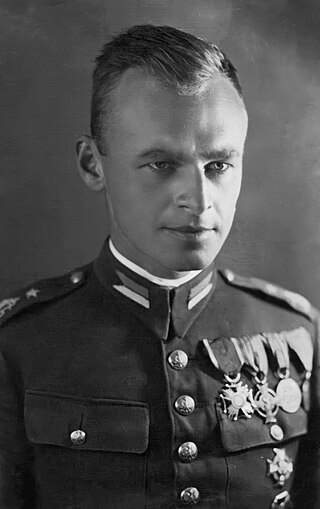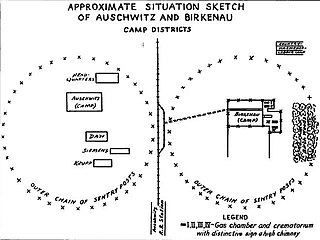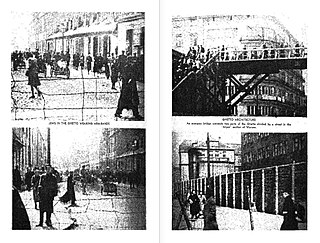
Auschwitz concentration camp was a complex of over 40 concentration and extermination camps operated by Nazi Germany in occupied Poland during World War II and the Holocaust. It consisted of Auschwitz I, the main camp (Stammlager) in Oświęcim; Auschwitz II-Birkenau, a concentration and extermination camp with gas chambers; Auschwitz III-Monowitz, a labour camp for the chemical conglomerate IG Farben; and dozens of subcamps. The camps became a major site of the Nazis' Final Solution to the Jewish question.

Witold Pilecki was a Polish World War II cavalry officer, intelligence agent, and resistance leader.
Józef Garliński was a Polish historian and prose writer. He was a survivor of Auschwitz concentration camp and wrote books on the history of World War II, some of which were translated into English. In particular, his book Fighting Auschwitz, translated into English in 1975, became a best-seller.

The Auschwitz Protocols, also known as the Auschwitz Reports, and originally published as The Extermination Camps of Auschwitz and Birkenau, is a collection of three eyewitness accounts from 1943–1944 about the mass murder that was taking place inside the Auschwitz concentration camp in German-occupied Poland during the Second World War. The eyewitness accounts are individually known as the Vrba–Wetzler report, Polish Major's report, and Rosin-Mordowicz report.

The Vrba–Wetzler report is one of three documents that comprise what is known as the Auschwitz Protocols, otherwise known as the Auschwitz Report or the Auschwitz notebook. It is a 33-page eye-witness account of the Auschwitz concentration camp in German-occupied Poland during the Holocaust.

Rudolf Vrba was a Slovak-Jewish biochemist who, as a teenager in 1942, was deported to the Auschwitz concentration camp in German-occupied Poland. He escaped from the camp in April 1944, at the height of the Holocaust, and co-wrote the Vrba-Wetzler report, a detailed report about the mass murder taking place there. Distribution of the report by George Mantello in Switzerland is credited with having halted the mass deportation of Hungary's Jews to Auschwitz in July 1944, saving more than 200,000 lives. After the war, Vrba trained as a biochemist, working mostly in England and Canada.

The issue of why the Allies did not act on early reports of atrocities in the Auschwitz concentration camp by destroying it or its railways by air during World War II has been a subject of controversy since the late 1970s. Brought to public attention by a 1978 article from historian David Wyman, it has been described by Michael Berenbaum as "a moral question emblematic of the Allied response to the plight of the Jews during the Holocaust", and whether or not the Allies had the requisite knowledge and the technical capability to act continues to be explored by historians. The U.S. government followed the military's strong advice to always keep the defeat of Germany the paramount objective, and refused to tolerate outside civilian advice regarding alternative military operations. No major American Jewish organizations recommended bombing.

Polish nationalism is a form of nationalism which asserts that the Poles are a nation and promotes the cultural unity of Poles. Norman Davies, in the context of Polish nationalism, generally defined nationalism as "a doctrine ... to create a nation by arousing people's awareness of their nationality, and to mobilize their feelings into a vehicle for political action".

Ryszard Janusz Bender was a Polish right-wing politician and historian. He is noted for his characterization of Auschwitz as a "labour camp", attracting allegations of Holocaust denial.

Aquila Polonica is an independent publishing house based in the U.S. and the U.K., founded in 2005 by Terry A. Tegnazian and Stefan Mucha. The company specializes in books based on eyewitness accounts, in English, of Poland in World War II.

Witold's Report, also known as Pilecki's Report, is a report about the Auschwitz concentration camp written in 1943 by Witold Pilecki, a Polish military officer and member of the Polish resistance. Pilecki volunteered in 1940 to be imprisoned in Auschwitz to organize a resistance movement and send out information about the camp. He escaped from Auschwitz in April 1943. His was the first comprehensive record of a Holocaust death camp to be obtained by the Allies.
Steven B. Bowman is an American scholar and academic particularly known for his research of Greek and Jewish relations throughout the past three millennia, with emphasis on Byzantine and Holocaust periods. He is a professor of Judaic Studies at the University of Cincinnati, where he teaches a wide range of courses in ancient and medieval Judaic Studies and modern Israel.
Geneviève Zubrzycki is Professor of Sociology (2003–present) and Director of the Weiser Center for Europe and Eurasia, the Copernicus Center for Polish Studies, and the Center for European Studies at the University of Michigan. She is also affiliated with the Frankel Center for Judaic Studies at the University of Michigan.

The organization of underground resistance movements in Auschwitz concentration camp began in the second half of 1940, shortly after the camp became operational in May that year. In September 1940 Witold Pilecki, a Polish army captain, arrived in the camp. Using the name Tomasz Serafiński, Pilecki had allowed himself to be captured by Germans in a street round up (łapanka) with the goal of having himself sent to Auschwitz to gather information and organize resistance inside. Under Pilecki's direction the Związek Organizacji Wojskowej, ZOW, was formed.

The Black Book of Polish Jewry is a 400-page report about the progress of the Holocaust in Poland published in 1943 during World War II by the American Federation for Polish Jews in cooperation with the Association of Jewish Refugees and Immigrants from Poland. It was compiled by Jacob Apenszlak with Jacob Kenner, Isaac Lewin and Moses Polakiewicz, and released by Roy Publishers of New York with an introduction by Ignacy Schwarzbart from the National Council of the Polish Republic. The book was sponsored by Eleanor Roosevelt, Albert Einstein, US Senator Robert Wagner, and other high-ranking community leaders. Historian Michael Fleming suggests it downplayed the true scale and manner of the Holocaust in an effort to elicit the empathy of its readership.
Czesław Mordowicz was a Polish Jew who, with Arnošt Rosin, escaped from the Auschwitz concentration camp in German-occupied Poland on 27 May 1944, at the height of the Holocaust. A seven-page report dictated by Mordowicz and Rosin joined the Vrba–Wetzler report and a report by Jerzy Tabeau to become the Auschwitz Protocols, a detailed account of the mass murder taking place inside the camp.
Jirmejahu Oskar Neumann (1894–1981), also known as Oscar Neumann, was a Czech lawyer and writer in Bratislava, part of the Slovak State between 1939–1945. From December 1943, during the Holocaust, he served as president of the Slovak Judenrat.

The Auschwitz Volunteer: Beyond Bravery is a nonfiction 2012 book consisting of a report by Polish resistance fighter Witold Pilecki, an introduction written by historian Norman Davies and a foreword by Chief Rabbi of Poland Michael Schudrich. The diary has been translated by Jarek Garliński and was published in English by Aquila Polonica. It covers a period of about four years during which Pilecki was on a mission to infiltrate the Auschwitz concentration camp. Pilecki wrote his report in Polish in the summer of 1945 for his Polish Army superiors; this book was the first time his report was published in English. His mission had two principal goals: smuggle out intelligence about the camp, and build a resistance organization among the prisoners.
Fighting Auschwitz: The Resistance Movement in the Concentration Camp is a 1975 book by Polish historian Józef Garliński about the resistance movement in Auschwitz, published by Julian Friedmann Publishers. The book's primary focus is the Związek Organizacji Wojskowej underground organization formed by the Polish resistance fighter, Witold Pilecki, known for infiltrating the Auschwitz concentration camp to organize resistance on the inside. The book, despite being close to 50 years old, is still considered a "definitive study of the topic" by modern scholars.
This is a select bibliography of English language books and journal articles about the history of Poland during World War II. A brief selection of English translations of primary sources is included. Book entries have references to journal articles and reviews about them when helpful. Additional bibliographies can be found in many of the book-length works listed below; see Further Reading for several book and chapter-length bibliographies. The External Links section contains entries for publicly available select bibliographies from universities. This bibliography specifically excludes non-history related works and self-published books.












